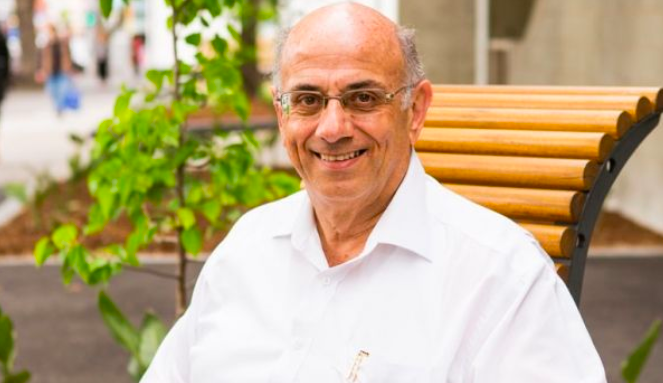
Robert Costa is one bloke who’s across the importance of new business investment in agriculture, and in Geelong. And about the business of attracting that investment to Geelong. Which might seem a little odd, given talk of the family offloading their giant $1 billion empire in the next few years. It’s already half owned by US firm Paine and Partners, under a five-year plan struck in 2012. Come 2017, Robert, and brothers Frank and Anthony, will decide whether they buy back, or buy more shares, or go public.
Robert – the other Costa if you like, given Frank’s high profile – is an affable bloke. He is dad to five adult children and grandfather to 13. He’s well-known in business circles but somehow enjoys a happy knack for flying under the radar while in plain view.
He has a ready grin and handshake, a slightly disarming Aussie vernacular, a relaxed demeanour and self-deprecating humour. Aged in his early 60s, he’s a product of Geelong’s St Mary’s Primary School and Lovely Banks’ Chanel College.
He grew up the son of a migrant greengrocer, learnt everything there was to learn about food and produce from the ground up, powered his way to the upper echelons of the nation’s produce wholesale sector, and helps oversee a group with more than 7000 employees and an annual turnover of about a billion dollars.
He has variously been (or remains) a mayor of Geelong West, chair of Monash and RMIT university’s Global Reconciliation bodies, chair of the Geelong Region Innovation and Investment Fund, a director of the Geelong Performing Arts Centre Trust, and he also chairs the private investment house Costa Asset Management.
But if Robert Costa’s public persona seems a little publicity-shy, it’s not that he hasn’t plenty to say. He’s just usually pretty busy, generally getting on with the job rather than spruiking.
Which is why his recent musings are unusual. But there’s a good reason for the change of character.
Costa spearheaded, very loudly and publicly, the latest push to have the Geelong Performing Arts Centre upgraded for the next generation.
The Costas have sponsored the centre for years, but an upgrade is overdue, he says. Geelong’s arts community needs it – as does the local economy, as its planners and plumpers try to lure new investors, and workforces, to the region.
At $140 million all up, it’s not cheap either. But the rewards could be extensive.
At this point, staring down the barrel of a State election, Costa’s renewal campaign has helped – along with politicking and jawboning by many others – secure election promises of $35 million and $30 million respectively from Liberal and Labor camps.
It’s a reasonable start, provided they can honour their promises.
“GPAC had 230,000 people go through it last year, including a lot of kids,” Costa says.
“It’s got such a deep penetration in the community. One family in every two has a family member involved in GPAC in some way at some time during the year.
“Personally, I see what GPAC does for Geelong and I think to be part of building that for the next generation is a real privilege. I mean, my kids live in Geelong, my grandkids live in Geelong; I want to see them enjoy GPAC for the next generation.”
Back on the subject of produce, and productivity, Costa says there are opportunities in agriculture but he’s mindful of the credit crunch on Australian operators looking for new capital to work up these opportunities. The agriculture sector is lugging a thumping $70 billion debt at present and the banks are not keen on extending much more largesse.
Overseas investors, notably Chinese investors, don’t necessarily share those qualms. Politicians are grappling with the whole foreign investment issue at the same time as manufacturing is sliding off a cliff and new business enterprises are ever more imperative.
But, as Costa explains, it’s not simple. You can’t just throw money at a problem, or an opportunity, and expect it to do what you want.
“It’s very hard to paint a broad brush across the whole industry and say this is what should happen,” he says.
“You have to look at how every business is structured and what segment it’s in. One of the key things that is really important, I think, the Achilles heel, is the source to market – the avenues to market.
“What stands us in good stead, over the past 40 to 50 years that supermarkets have been here, is that we’ve built up a strong history and relationship with, firstly, Woolworths and Coles, and more lately Aldi.
“We would be the largest supplier of produce to all three of those, and it’s important to be able to have that avenue to market. Unfortunately, you still see a fair bit of it where people, we call them the ‘grow and hope’, say ‘Let’s go and plant and then we’ll sell it’. But it’s just not that easy.
“That’s the Achilles heel and that’s now recognised by banks. It’s one of the key things they look at when they’re funding a producer: ‘Where’s your market?’
“The banks look at a lot of those fundamentals. They’ll look at the particular category, its history. There’s a lot more data available today than there ever used to be, but there’s still a lot of opportunities.”
Costa says Australian aspirations to the clean green thrust in produce, and exports, sounds good but, again, is not simple – and definitely not a cheap pursuit. Safety issues, traceability, product management, temperature control … the list goes on.
“All this requires a very strong investment in capital and, of course, for those growers who can’t invest that capital, then it makes it very difficult to appeal to, say, a major supermarket.
“One thing they’re very consistent on, is they need traceability on every bit of product. So if we sell them a box of grapes and they get a problem later on for some food safety issue, we’re able to go back and say exactly which row it was picked from, who the picker was, the date, the whole thing – trace the post-harvest management, the whole thing all the way through.
“You’ve got to be a certain scale to be able to invest that kind of capital.”
Costa says Geelong’s economic character has been transitioning from manufacturing since its textile industries started closing more than 30 years ago. It’s now a university town, he says, with new technology-led industries pointing to the future.
“The kind of people you need to support that industry are looking to be entertained and engaged, and they want their kids educated in the arts,” he says, back on the renewal campaign.
“They want to have them exposed to a high level of culture and GPAC has a great range – you go everywhere from Peppa Pig to great opera and even the Shakespeare’s Globe company.
“It’s very sophisticated – the theatre season is fabulous in itself.”
No argument there, even the kids will agree. As for eating their vegies, well, that’s a different matter …
This article appeared in the Weekly Review 28 October 2014


